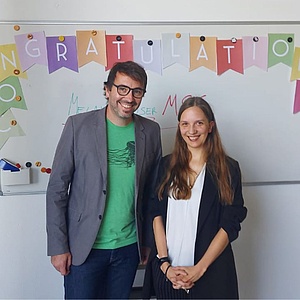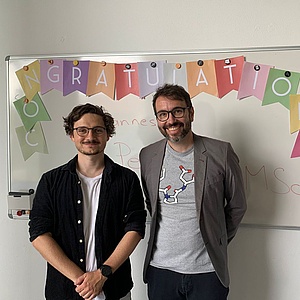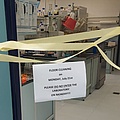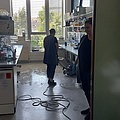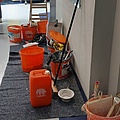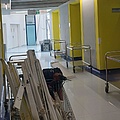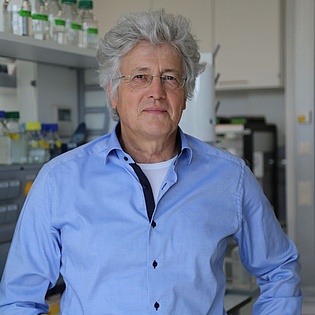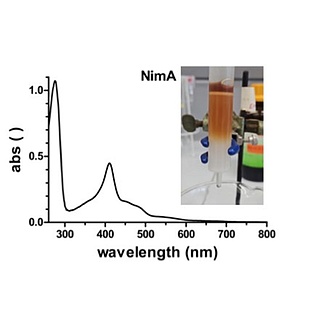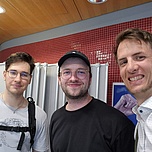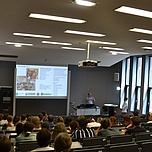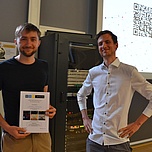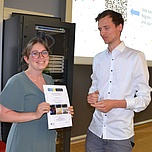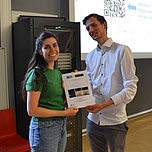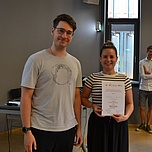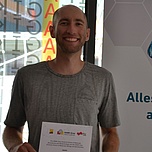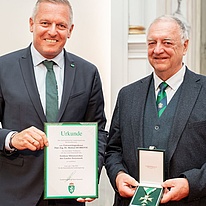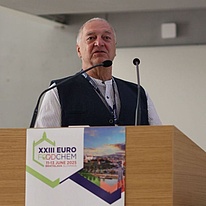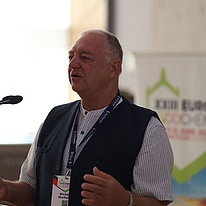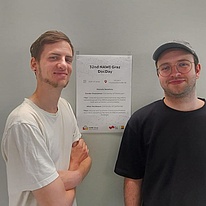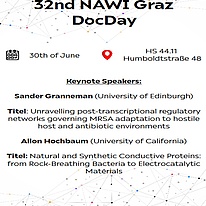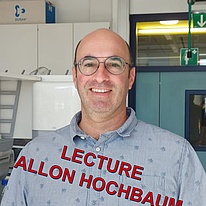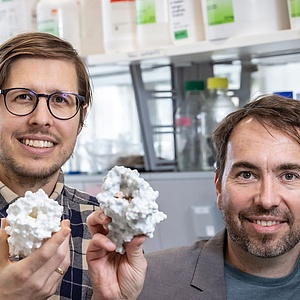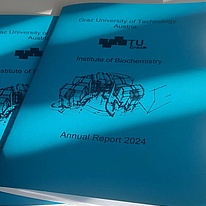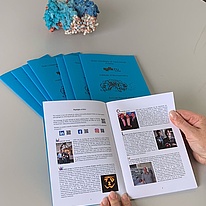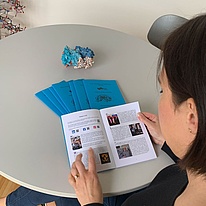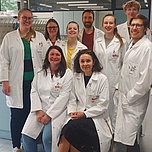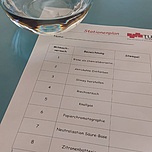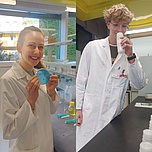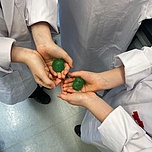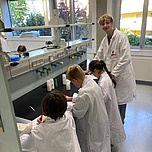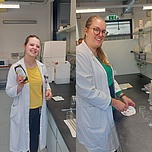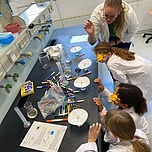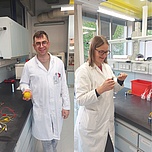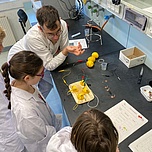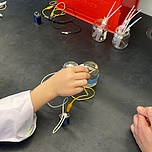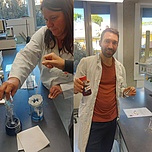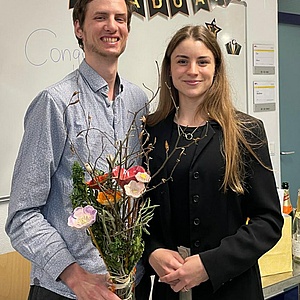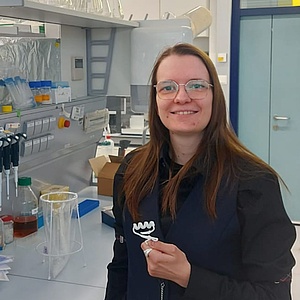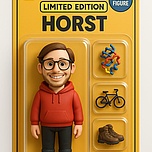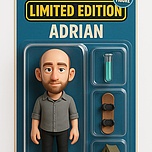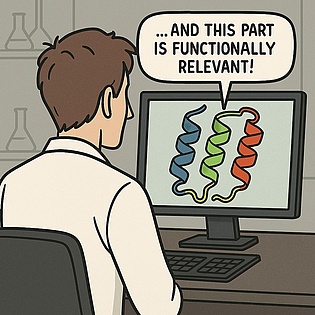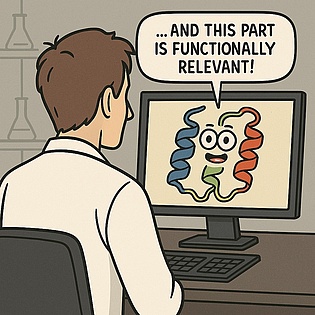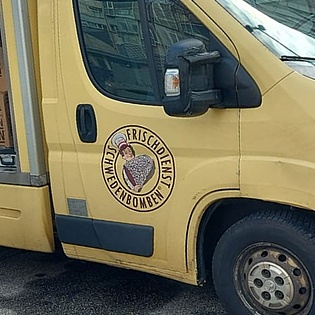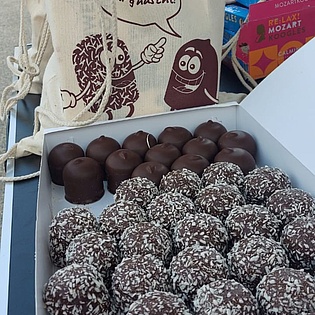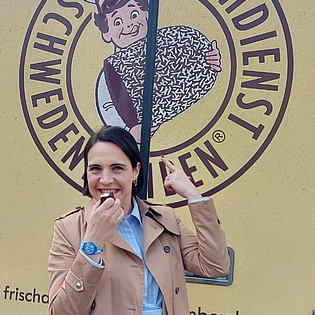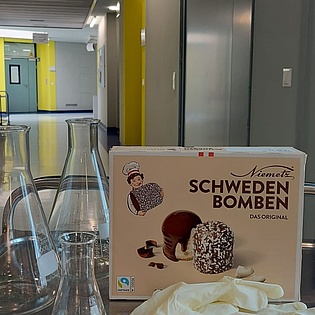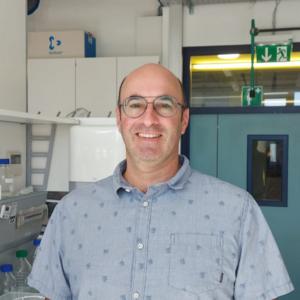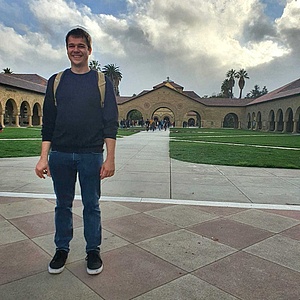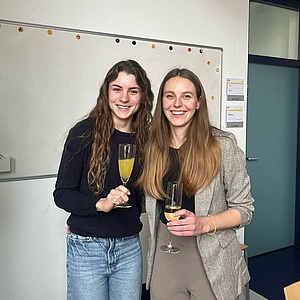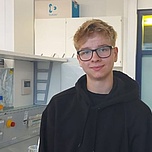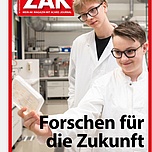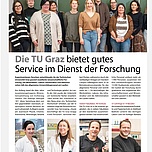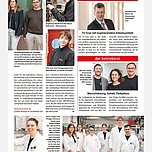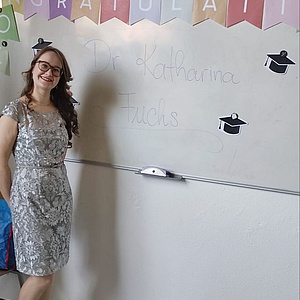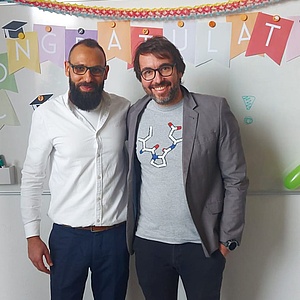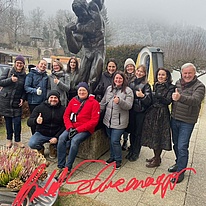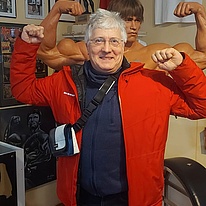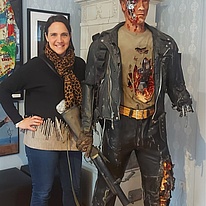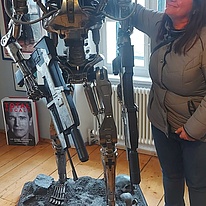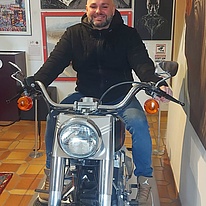Congratulations to our student Melanie Moser for successfully completing her Master’s degree!
Her thesis, “Redesign of a de novo homo hexameric protein pore for crystallisation”, marks an impressive achievement and a true milestone in her academic journey.
We are excited that Melanie will continue to be part of our Institute of Biochemistry team as a technician, and we look forward to many more great collaborations ahead.
(Kopie 1)
21.07.2025
Summer Glow-Up at the Institute of Biochemistry!
No summer break for science here! While experiments continue full steam ahead, our labs and offices are getting a fresh new look.
Painters are touching up the walls, and our fantastic cleaning team is making the floors shine like never before.
Science never stops—and neither does our commitment to keeping things spotless and efficient!
10.07.2025
Research in Action – Even on a Sabbatical!
During his research semester our head of the Institute of Biochemistry, Peter Macheroux, continues to actively contribute to a promising collaboration with Prof. Hartig's group at the University of Konstanz.
Together, they are investigating a recently discovered nitroimidazole resistance gene, NimA, identified in the anaerobic gut bacterium Massilimicrobiota timonensis. The gene was successfully expressed recombinantly, and the resulting protein was isolated. Spectroscopic analysis reveals that this intriguing protein contains two cofactors: a flavin (yellow) and a heme (reddish-brown).
Current research aims to shed light on the specific functions of these cofactors and to unravel the mechanism of this unique flavohemeprotein. Exciting insights are on the horizon!
And today, we celebrate not only scientific progress, but also Peter’s birthday – Happy Birthday and all the best for the coming year!
02.07.2025
And just like that, the 32nd NAWI Graz DocDay is a wrap!
A heartfelt thank you to all participants for contributing with inspiring talks, creative posters, and lively scientific discussions – all while braving the summer heat!
Special thanks to our guest speakers Sander Grannemann and Allon Hochbaum for offering deep insights into their scientific work and careers.
Congratulations to our award winners:
- Adrian Tripp – Best Talk (Jury), sponsored by Bartelt
- Lucija Sovic – Best Talk (Audience), sponsored by Microsynth Austria
- Nikolina Todorovic, Nadine Egger & Johannes Breithofer – Best Posters (Jury), sponsored by ChemBioChem/Wiley
Huge thanks to the organizing team Kirill Kuhlmann, Maximilian Fuchs, and Oliver Eder, as well as to Kristina Schild and Christine Rother for their incredible support. We also gratefully acknowledge Tea Pavkov-Keller and Harald Pichler for their guidance and encouragement throughout.
Let’s keep the science going – see you all at the next DocDay!
01.07.2025
Still active after retirement – and now awarded twice!
Our former colleague Michael Murkovic, who retired in October 2024, continues to share his expertise through lectures and research. In May 2025, he was honored with the "Gold Medal of Honor of the Province of Styria" for his outstanding scientific contributions.
With a background in Technical Chemistry from TU Graz and a specialization in Food Chemistry, Michael has been a pioneer in the study of carcinogenic substances in food since the 1990s, developing innovative approaches to reduce human exposure. His work has led to more than 120 scientific publications and numerous international presentations.
Most recently, at the XXIII EuroFoodChem conference in Bratislava on June 11, 2025, he delivered the prestigious Czedik-Eysenberg Lecture presented to outstanding scientists in the field.
Congratulations, Michael – your impact continues to grow!
Foto: TU Graz/Land Steiermark, Robert Binder
24.06.2025
Save the Date: 32nd NAWI Graz DocDay 2025 – June 30th at the University of Graz!
We are excited to invite all interested colleagues, students, and friends of science to this year’s 32nd NAWI Graz DocDay 2025, an annual symposium organized by PhD students of Graz University of Technology and the University of Graz. This includes the doc schools “Molecular Biology and Biochemistry” and “Molecular Biosciences and Biotechnology”.
When? June 30, 2025
Where? University of Graz
This year, the event is co-organized by our PhD students Oliver Eder and Maximilian Fuchs from the Institute of Biochemistry.
A special highlight will be the keynote lecture by our guest researcher Prof. Allon Hochbaum (University of California):
“Natural and Synthetic Conductive Proteins: From Rock-Breathing Bacteria to Electrocatalytic Materials”
The symposium will showcase innovative research by PhD students, with talks, a poster session, and contributions from academia and industry.
Don’t miss this opportunity to exchange ideas, build connections, and engage with the community — during presentations, discussions, and the social get-together afterwards!
Everyone interested is warmly welcome to join us!
11.06.2025
Congratulations to our former Master's student Sigrid Kaltenbrunner for receiving the TCVB Outstanding Master’s Thesis Award 2025 at this year’s Science Day of the Faculty of Technical Chemistry, Chemical and Process Engineering, and Biotechnology!
This prestigious award recognizes exceptional academic achievement, scientific independence, creativity, and dedication in producing an outstanding thesis.
We at the Institute of Biochemistry are proud of Sigrid's accomplishment and warmly congratulate her on this well-deserved recognition!
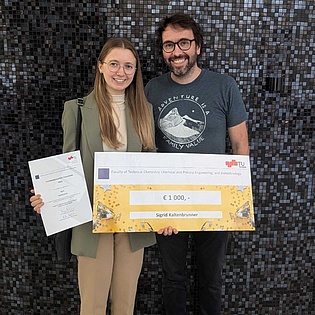
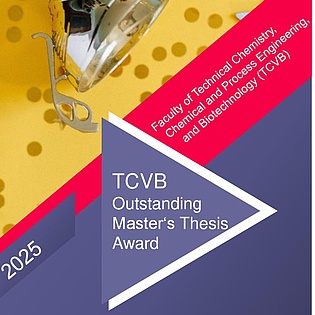
22.05.2025
Gustav Oberdorfer and postdoc Horst Lechner were featured for their work on biohybrid LEDs—an innovative approach to creating sustainable lighting by replacing rare-earth metal phosphors in white LEDs with organic fluorescent dyes embedded in designed proteins.
16.05.2025
Hot off the press: our Annual Report!
Curious about what we've been up to at the Institute of Biochemistry? Our latest Annual Report gives you a peek behind the scenes — from exciting research projects to lab life and everything in between.
Get to know the focus areas of our research groups and see what made last year special for us.
Have a look: ANNUAL REPORT 2024
06.05.2025
Science meets curiosity!
As part of the Children’s University, we welcomed the curious minds of Volksschule Rosenberg to our Institute of Biochemistry. Dressed in real lab coats, the young scientists jumped right into action:
- Build a battery using a lemon?
- Make their own sticky slime?
- Hear the bang of hydrogen explosions?
- Extract color from red cabbage?
Yes, they tried it all – and discovered just how exciting chemistry can be!
To top it off, we showed them that liquid nitrogen isn’t just for science... it also makes delicious ice cream!
We loved having you here and wish you all the best on your educational journey. Who knows – maybe one day we’ll see some of you back here as students!
02.05.2025
Big congratulations to Miriam Huber!
We're excited to celebrate Miriam Huber from the Institute of Biochemistry at TU Graz for passing her Master's exam! Her thesis, "Characterization of metal-dependent protein phosphatase-bacteriophytochrome (PpmP) homologs", is a great achievement — and we're proud to have been part of her journey. Wishing you all the best for what’s next, Miriam!
On the picture you can see Miriam wirh our PhD-Student Oliver Eder.
24.04.2025
Meet our visiting researcher, Sarah Berger!
Born and raised amid the picturesque landscapes of Upper Austria, Sarah completed her PhD at the University of Graz, where she delved into the fascinating world of imine reductases.
Following a brief but enriching tenure in industry at Enzyan, she joined the group of Anna Peacock at the University of Birmingham and is now a guest researcher in Gustav Oberdorfer’s group, working on the development of MRI contrast agents.
She is excited to collaborate with researchers at IBC and contribute to the field of protein design.
Besides her fascination of proteins Sarah loves to swim, embracing her motto: "To reach the source, one must swim against the current."
We’re delighted to have her on board!
17.04.2025
03.04.2025
Here at the Institute of Biochemistry, we research proteins which are essential building blocks of live. They are not just an important supplement in your diet if you want to gain muscles but they also are important for a myriad of other body functions. For example, they enable you to sense light which lets your brain see this text and process it.
But how do specific proteins exactly work? This question is often answered in yearlong academic studies and countless experiments. However, with AI on the horizon, there are now novel methods available to get these answers faster.
In a recent study in our institute, a machine learning tool was tuned to make proteins "talk" about which parts of them are important for the jobs they do. This tool was used to research a bacterial light sensor, a cousin to the light sensors which are used by plants. The insights of this study might one day help us to understand better how plants, an important pillar of our diet, react to sun light. Read here the pre-print.
We congratulate Oliver Eder and Massimo Gregorio Totaro of the Group of Andreas Winkler and the Group of Gustav Oberdorfer for the successful completion of this highly collaborative project and wish good luck for the (potentially) upcoming revision.
27.03.2025
25.03.2025
Meet our visiting researcher, Allon Hochbaum! Since summer 2024, he has been part of the Protein Design group at the Institute for Biochemistry at TU Graz.
Allon’s home lab at University of California, Irvine, focuses on electronic conductivity in natural and synthetic protein wires, as well as technologies to measure microbial metabolism for health, bio-energy, and environmental applications. Here in Graz, he is applying computational approaches to design synthetic versions of these conductive microbial protein wires.
Allon and his family have embraced life in Graz, enjoying both the scientific environment at IBC and the opportunity to explore Austria and its neighboring countries.
We’re thrilled to have him on board!
18.03.2025
Markus Braun is one of our University Project Assistant in the Research Group Protein Design/AG Oberdorfer.
Markus is currently in the U.S. for a research stay at Stanford's Department of Biochemistry, supported by a Marshall Plan Scholarship. His project focuses on uncovering the geometric and energetic principles behind the catalytic mechanisms of natural enzymes. The insights gained will help develop novel, tailor-made enzymes for industrial applications.
Markus will remain in the U.S. until summer 2025 before returning to the Institute of Biochemistry at TU Graz to complete his PhD. We wish him a fantastic and inspiring time abroad and know he will gain many valuable experiences along the way!
13.03.2025
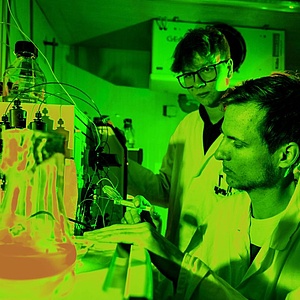
Congratulations!
FWF principal investigator project on red-light regulated phosphatases awarded to Andreas Winkler, our Associate Professor and deputy head of the Institut of Biochemistry.
You can find more information here: FWF-Project
New opportunities for MSc, PhD and Post-Doc candidates - if interested, please contact Andreas Winkler (andreas.winkler@tugraz.at).
27.02.2025
We would like to congratulate Gabriela Shickle on fininshing her master’s thesis „Molecular Mechanisms of Signal Integration in blue light-regulated Diguanylate Cyclases“! Gabriela worked in the group of Andreas Winkler. She is pictured with Miriam Huber (left on the picture), also a master student at the Institute of Biochemistry.
Gabriela, we wish you all the best!
24.02.2025
Since September 1, 2023, Christoph Schaffer has been part of our team at the Institute of Biochemistry, where he is training to become a laboratory technician. With his dedication, curiosity, and enthusiasm, he is already a valuable addition to our team.
We are especially proud that the latest issue of „ZAK“, the magazin of Arbeitskammer Steiermark, features several apprentices from TU Graz, including „our“ Christoph.
We are excited to support Christoph on his journey and look forward to seeing him grow in his role!
28.01.2025
23.01.2025
20.01.2025
The first excursion of the year took the AG Protein Biochemistry on an unexpected yet legendary journey—straight into the world of Arnold Schwarzenegger. We swapped our lab coats for leather jackets and made our way to Thal, Austria, the birthplace of the Terminator himself.
You might be wondering—what do biochemists have in common with a Hollywood action star, a bodybuilding legend, and a former governor? More than you’d think! As scientists fascinated by proteins, we couldn’t pass up the chance to learn about one of the most famous applications of muscle biochemistry: bodybuilding. Schwarzenegger’s dedication to sculpting his physique is a testament to the power of discipline, training, and (of course) proteins.
The Arnold Schwarzenegger Museum, housed in his childhood home, is a treasure trove of memorabilia. From his first dumbbells to his governor’s desk, the museum traces his incredible journey from a small Austrian village to global stardom. Standing in the very room where young Arnold dreamed of greatness was nothing short of inspiring.
Some of us tried to mimic his famous poses—some more successfully than others. Others were more captivated by the detailed exhibits on his movie career, political achievements, and, of course, his bodybuilding triumphs.
Hasta la Vista, Thal - Our visit to the Schwarzenegger Museum was the perfect way to kick off the new year. It reminded us that no matter our background—be it science or cinema—passion and perseverance can take us far. Who knows, maybe next time we’ll be back, a little stronger and a lot more inspired.
Until then, we’ll stick to flexing our brain muscles in the lab!
